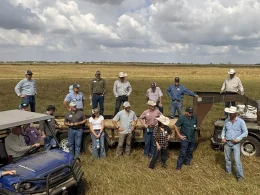Denmark is set to implement a tax on livestock farmers starting in 2030, aiming to address methane emissions from cows, sheep, and pigs, a significant contributor to global warming. This initiative marks Denmark as the first country to impose such a tax, part of its strategy to achieve a 70% reduction in greenhouse gas emissions from 1990 levels by 2030, as announced by Taxation Minister Jeppe Bruus.
Beginning in 2030, Danish livestock farmers will face a tax of 300 kroner ($43) per ton of carbon dioxide equivalent, increasing to 750 kroner ($108) by 2035. However, due to a 60% income tax deduction, the effective cost per ton will start at 120 kroner ($17.3) and rise to 300 kroner by 2035.
Methane, despite receiving less attention than carbon dioxide, is significantly more potent in trapping heat over 20 years, according to the U.S. National Oceanic and Atmospheric Administration. Sources such as landfills, oil and gas systems, and livestock contribute to methane emissions, which have seen rapid increases since 2020. Livestock alone account for approximately 32% of human-caused methane emissions, according to the U.N. Environment Program.
“We will take a big step closer in becoming climate neutral in 2045,” Bruus said, adding, “Denmark will be the first country in the world to introduce a real CO2 tax on agriculture.” He hoped that other countries would follow suit.
In Denmark, a late Monday agreement was struck between the center-right government and stakeholders including farmers, industry representatives, and unions. The deal was formally presented on Tuesday.
Denmark’s decision follows months of farmer protests across Europe, where agricultural communities have voiced concerns over climate change mitigation measures and regulations they argue could push them into financial distress.
















